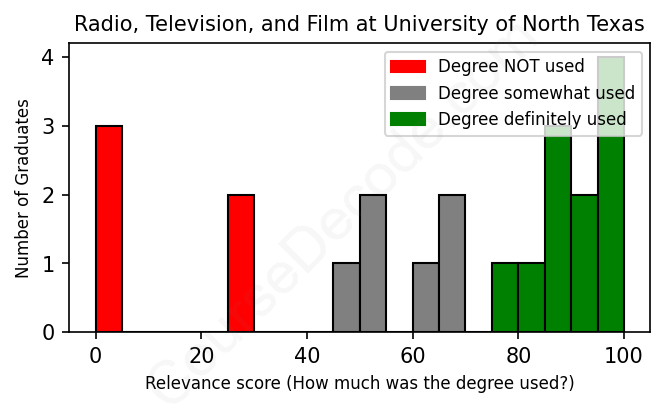
First, some facts. Of the Radio, Television, and Film graduates from University of North Texas we've analyzed , here's how many have used (or NOT used) their degree in their career:

These are estimates based on AI analysis of 22 LinkedIn profiles (see below).
The verdict? Slightly below average. Overall, with an average relevance score of 63%, Radio, Television, and Film graduates from University of North Texas have a slightly lower likelihood (-4%) of finding work in this field compared to the average graduate across all fields:
And for comparison, here's the chart for all profiles we've looked at across all degrees.
Also, after graduating, only 27% of these graduates have pursued further education other than another Bachelor's degree (such as a Masters degree or other), compared to the average across all profiles of 35%. This suggests a Bachelors degree is enough for most Radio, Television, and Film graduates, and it's normal to look for work straight after graduation.
See the details:
|
Relevance score: 67% We think this person has gone into a career only somewhat relevant to their degree. We think this person has gone into a career only somewhat relevant to their degree.
DEGREE INFOGraduated in 2010 from University of North Texas with a Bachelor of Arts - BA in Radio, Television, and Film. Also pursued further education since (see below). JOB HISTORY SINCE GRADUATIONSales Associate Best Buy Aug 2014 - Jul 2015 Front of House Team Member  Freebirds World Burrito Jan 2019 - Mar 2020 Director of Video Production  TenX Media Jul 2020 - Oct 2020 Video Editor  SOFA COUCH MEDIA Dec 2020 - Mar 2021 Youth Engagement Specialist  ROY MAAS YOUTH ALTERNATIVES, INC. Jun 2021 - Dec 2021 Certified Peer Support Specialist  The Center for Health Care Services Dec 2021 - Jun 2023 Certified Peer Support Specialist III  Texas Health and Human Services Jul 2023 - Dec 2023 Videographer  StoryMakers Production Co. Apr 2015 - Present Peer Support Specialist  RecoveryLink Apr 2024 - Present FURTHER DEGREES DONE SINCE GRADUATINGAssociate of Arts - AANorthwest Vista College 2019 - 2023 ABOUTWhile working on my Bachelor of Arts from the University of North Texas I helped lead an initiative with the Housing department known as REAL Communities. REAL stood for Residents Engaged in Academic Living. For two years before graduating, I conceptualized and implemented programming specific to the majors of Radio/Television/Film and Journalism while fulfilling all other responsibilities related to being a Resident Assistant. I have now completed a second degree from Northwest Vista College while maintaining a 4.0 GPA while also being the recipient of the Wood Group Scholarship & the Greehey Family Foundation Endowed Scholarship in Fall of 2022. In 2020 I started the process of becoming certified as a Mental Health Peer Specialist. I now have 18 months of experience as a Peer Support Specialist at the county level and 6 months at the state level. This has instilled a passion of working in mental health that is leading me now on a path to one day become a licensed professional counselor. |
The top 10 most common jobs done by the graduates we've analyzed (ranked most common to least) are:
In looking at the job history of graduates with a degree in Radio, Television, and Film from the University of North Texas, it's clear that many of them have taken on various roles, but not all are closely tied to their studies. The most common jobs appear to be in video production, editing, and other media-related roles. Positions like Video Editor, Director of Video Production, and Videographer clearly align with the skills gained from their degree and demonstrate a strong connection to the field of Radio, Television, and Film. These roles involve hands-on work in media creation, editing, and storytelling, which are foundational aspects of their education.
However, a significant number of graduates have also ventured into jobs that are quite distant from their studies. Many have taken on roles in retail, education, and healthcare, which generally do not draw on the specialized skills they learned. Positions such as Sales Associate, High School Teacher, and Peer Support Specialist reflect a focus away from media production and storytelling, showing that not all graduates are working in relevant fields. Overall, while there are definitely strong connections to Radio, Television, and Film in many job roles, there’s also a noticeable trend of graduates branching out into other industries where their degree might not be as directly applicable.
Here is a visual representation of the most common words in job titles for Radio, Television, and Film graduates (this is across all Radio, Television, and Film graduates we've analyzed, not just those who went to University of North Texas):

Looking at the career trajectories of graduates from the Radio, Television, and Film program at the University of North Texas, it seems like outcomes are mixed. For many, their first jobs after graduation seem to be in fields that are only somewhat related to their degree or in completely different sectors. A notable pattern is that several graduates have started their careers in roles like teaching, sales, and marketing, which aren't directly tied to their studies in media production or film. It takes a few years, but many seem to find their way into more relevant jobs. For instance, after a few years, some move into video production, editing, and creative roles, showing that those initial jobs might have just been stepping stones.
Fast forward five to ten years, and some graduates have really carved out niches for themselves in the media industry. Positions like Video Producer, Operations Manager, and Creative Media Director indicate that a portion of these grads eventually return to roles that truly leverage their education. However, there are also a significant number who have drifted away from the media world into areas like customer service, finance, and administrative roles, suggesting that while the degree opens doors, it doesn't guarantee a career in Radio, Television, and Film. Overall, it's a bit of a mixed bag, where tenacity and adaptability seem to play crucial roles in determining long-term success in the field.
Honestly, a Bachelor’s degree in Radio, Television, and Film can be a mixed bag in terms of difficulty. At the University of North Texas, like many similar programs, you'll dive into both creative and technical skills, which can be a lot to juggle. Some folks find the hands-on projects and collaboration with classmates super fun and engaging, while others might struggle with the workload and deadlines, especially if they're not used to working on projects in a group setting. It’s definitely not the easiest degree out there, but if you have a passion for storytelling and media, you'll probably enjoy the process and find your groove. Just be ready to put in some effort, especially if you want to make the most of all the cool opportunities that come your way!
Most commonly, in the LinkedIn profiles we've looked at, it takes people 4 years to finish a Bachelor degree in Radio, Television, and Film.
Looking at these graduates from the University of North Texas, it seems like they’ve had pretty mixed financial outcomes after school. Some folks, especially in video production and digital marketing, have landed solid roles, indicating they could be making decent money, especially as they climb the ladder. For example, positions like Video Production and Operations Manager at the City of Dallas or Marketing Coordinator look like they could be on the higher end of the pay scale. On the other hand, we see several graduates in more entry-level or service-oriented jobs that might not pay as well, like teachers or sales associates, especially early in their careers. So, while some are likely doing just fine financially, others might be earning more on the modest side. Overall, it’s a bit of a mixed bag!
Here is a visual representation of the most common words seen in the "about" section of LinkedIn profiles who have a Bachelor degree in Radio, Television, and Film (this is across all Radio, Television, and Film graduates we've analyzed, not just those who went to University of North Texas). This may or may not be useful:

Here are all colleges offering a Bachelor degree in Radio, Television, and Film (ordered by the average relevance score of their Radio, Television, and Film graduates, best to worst) where we have analyzed at least 10 of their graduates:
| College | Score | Count |
|---|---|---|
 University of North Texas University of North Texas
|
63 | 22 |